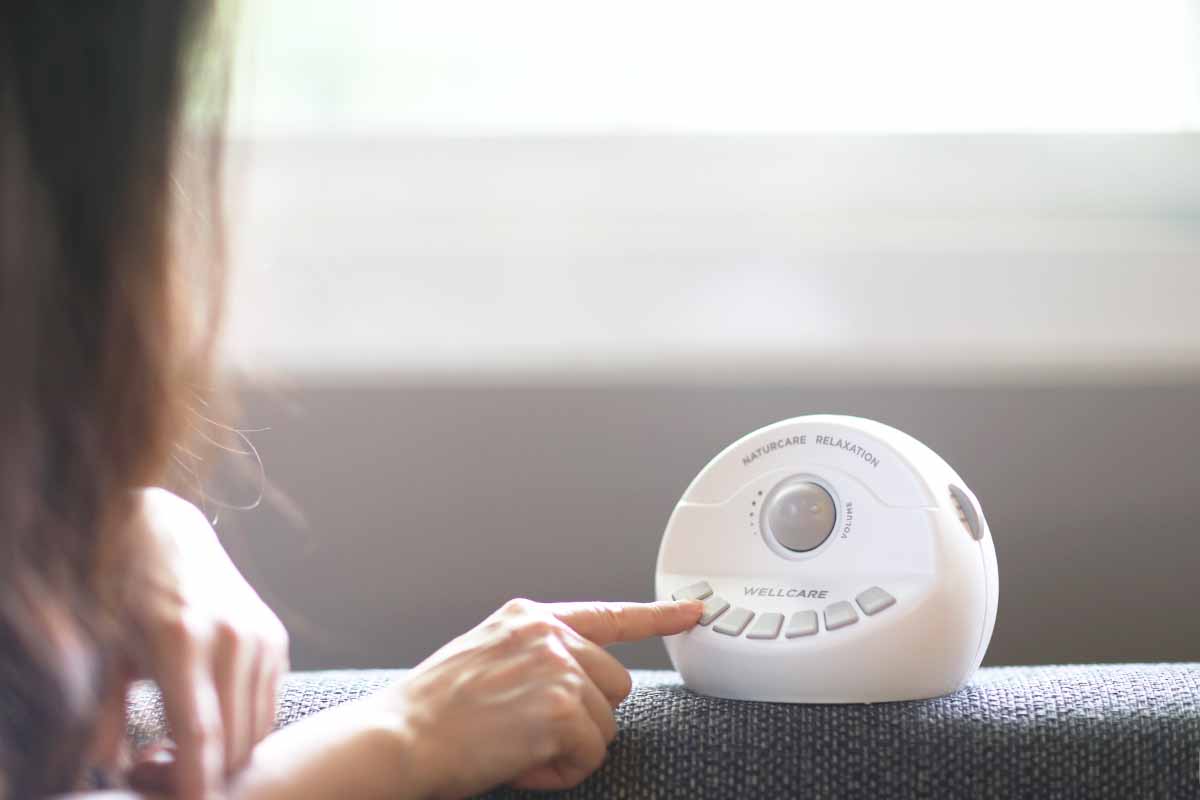
Sometimes, people struggle to sleep and end up in a vicious cycle of insomnia or fall into the rabbit hole of scrolling through Their phones. Other challenges affect the way people fall asleep. These could be stress, chronic pain, or distracting environmental noises.
Nevertheless, there are ways to help induce sleep, such as white noise and soothing sounds.
Zeb’s white noise story
Zeb moved to London from Switzerland and left the country in a rush, with no laid-out plans. She worked part-time and full-time jobs. Plus, she opened her bedroom to subletters and depended on her best friend to reload her card.
While slowly easing into London life, Zeb’s quiet moments were often disturbed by different kinds of noises. She hears her neighbours brewing tea, chatting until midnight, or crying incessantly because of a heartbreak. She has yet to become used to the cityscape and its countless clangors.
She is unable to get proper rest in her quarters. Hence, she slowly turned to listen to white noise as she got used to the peace in her previous residence in Switzerland. Zeb asked her best friend what to listen to so she wouldn’t get distracted while working. Rain sounds were one of the top recommendations; she listened to them as she worked.
Before listening to white noise, Zeb would experience anxiety or panic attacks whenever she felt overwhelmed by different noises that would clamour for her attention. Things became better when she heard a white noise playlist with her headphones. It helped her relax, calm herself, and eventually sleep peacefully.
With white noise, Zeb survives the stress that extrinsic factors give her. She felt liberated from all the things that kept her down and stressed. So, what is white noise exactly?
Defining white noise
Various sound waves could be further broken down into two categories: frequency and amplitude. Frequency refers to how fast the waveform vibrates per second. Amplitude means the power or displacement of points on a wave.
According to Dr Axe, white noise refers to the noise that encompasses a mixture of all audible frequencies that human ears can hear. It includes low-, mid-, and high-frequency sounds. Plus, researchers involved in this study discovered that children with ADHD who listened to white noise improved their cognitive performance, especially on memory tasks and speech recognition.
Although it works for some people, white noise does not provide a general enhancement for all aspects of cognition, and it’s still unclear if it may decrease attention among certain people, such as those who focus best when working in silence. Overall, studies suggest differing effects on perception and cognition when white noise is used, which may depend on specific task demands and timing.
Some of these noise types are further classified according to the colour of their light wavelengths. White lights contain all the frequencies in a visible spectrum where the white noise got its name. Pink noise, on the other hand, means a bass-boosted white noise. It’s generally perceived as balanced white noise, wherein most people feel comfortable listening to. Pink noise got its name from the pink or violet hues present at the lowest frequencies of light.
According to this article in ADDitude Magazine, white noise has helped people with ADHD improve their focus and executive functions, spend more time on their hobbies, and fall asleep quickly.
On the flipside, sounds and vibrations can also cause stress and anxiety. A study in South Korea revealed that occupational noise and vibration caused anxiety symptoms among male and female participants. Therefore, the type of frequency can make or break your performance at work or school.
Is white noise terrible for you?
People find it easy to fall asleep while playing some background music to block the noise from outside. But, some researchers claim that white noise might be terrible for you. White noise may irritate your ear and may result in hearing some high-frequency sounds.
People may not know, but white noise is generally everywhere. You hear it when you commute, watch TV, or in your daily activities. In a review article published in JAMA Otolaryngology-Head & Neck Surgery, researchers from the University of California, San Francisco, studied whether or not white noise aggravates tinnitus.
The researchers studied a series of previous studies that promulgated that listening to white noise for more extended periods daily may affect brain function. They contend that exposure to white noise alters the brain in an unfavourable way.
They conclude that white noise sound therapy is not advised as a tinnitus treatment because both tinnitus and white noise speed up the ageing process in our brains.
On the other hand, it also mentioned that the animals were exposed to noise between 60 and 70 decibels (the same level as white noise machines), and the US Occupational Safety and Health Administration considers this pressure level range to be safe.
According to the National Institute of Health, prolonged exposure to noise of more than 75 decibels A-weighted (dBA) causes metabolic changes in sensory hair cells in the cochlea. Hence, US EPA highly recommends limiting exposure to 55 dBA at an average of 24 hours.
On the other hand, the EU Environmental Noise Directive (END) states that the threshold is 55 decibels. The annual average noise level at night has a threshold of 50 decibels. Any sound more than that will start giving rise to sleep disturbances.
However, according to the research from JAMA Otolaryngology, nontraumatic noise exposure affects people, such as a reduction in neural inhibition, which means losing the ability to filter unessential information, prolonged time for processing signal changes in the brain, and less accurate interpretation of information in the brain.
Additional research contends that prolonged exposure to white noise changes the way our brains are wired negatively. We harm our central auditory system when we attempt to decrease the signs of tinnitus.
Even though many academics are working on this issue, it is still too early to draw the conclusion that unstructured noise affects everyone in the same way.

How does white noise help people?
A study suggests that white noise may help people to boost their auditory working memory performance through stochastic resonance. Stochastic resonance affects a system's response to an external factor. In other words, the noise makes it easier for someone to return to their tasks. Generally, noise has been considered a distraction or interference when working.
However, researchers found that noise at a moderate level boosts cognition which helps people become more productive in their tasks. People diagnosed with the attention-deficit hyperactive disorder (ADHD) with inattentive type showed remarkable improvements in understanding when exposed to white noise.
Therefore, white noise helps people with ADHD to block out other distractions and focus on their tasks. It resulted in better cognitive performance, improved word recall, and additional charges.
How white noise helps people with auditory problems?
Aside from creating a peaceful environment and boosting focus, white noise helps people with PTSD and helps them deal with their trauma. It may help people in hospitals under strict monitoring. Other noises like beeping, talking, and opening or closing doors may disrupt sleep and negatively affect their healing process.
A white noise machine can alleviate those sounds and let patients rest calmly. Other than that, people with tinnitus troubles may also benefit from white noise.
White noise helps with hyperacusis
Hyperacusis is a hearing condition that makes people highly sensitive to sound. Hence, listening to everyday noises feels extremely loud. These people often find it challenging to tolerate running water, wind breeze, and rain sounds, which challenge accomplishing household tasks and work duties. Consequently, people with hyperacusis may avoid social gatherings that would trigger anxiety, stress and social isolation.
How to treat hyperacusis?
Treatment depends on the cause. But, the ultimate goal is to help people manage their symptoms and lower their hearing sensitivity.
What causes hyperacusis?
- Migraines accompanied by light and sound sensitivity, nausea and vomiting.
- Noise pollution
- Head injury
- Post-traumatic stress disorder (PTSD)
- Tay-Sachs disease (a genetic disorder that destroys nerve cells)
- Autism spectrum syndrome (developmental disorder)
- Chronic fatigue syndrome (sleep abnormalities, excessive fatigue, pain, and other symptoms worsened by too much exertion)
What are the common symptoms of hyperacusis?
- Anxiety
- Depression
- Discomfort when exposed to loud sounds
- Sounds at average volume feel unbearable or distorted
- Losing sleep leading to insomnia
- Easily distracted and difficulty in concentrating
Some ways to help manage hyperacusis include:
- Cognitive behavioural therapy (CBT) - A mental health professional will teach you how to manage your responses to specific triggers and stress.
- Tinnitus retraining therapy (TRT) - TRT uses a device similar to a hearing aid. It creates a low-intensity sound that lets your brain listen to the noise and tinnitus. It helps people tolerate different sounds and lessen sensitivity.
- Sound desensitisation - With a white noise machine, you’ll listen to soft static noise for a while every day. But, ensure that you consult a hearing specialist beforehand.
Other preventive measures:
- Use noise-cancelling headphones.
- Lower the volume of your music when you listen.
- Wear hearing protection when you work in a boisterous environment.
White noise helps with tinnitus
Tinnitus is the sensation of hearing sounds when the environment is quiet. It is not a disease but a symptom of some other health condition. Tinnitus is a sensorineural reaction in the brain that may damage the ear and the auditory system.
There are two types of tinnitus. First is subjective tinnitus, which includes head and ear sounds that you only hear. The second is objective tinnitus. It pertains to noises produced by your body that doctors hear through a stethoscope. Most people who experience tinnitus describe it as hissing, swooshing, whistling, buzzing, or ringing.
What causes tinnitus?
- Hormonal changes in women
- Ear and sinus infections
- Heart disease
- Noise-induced hearing loss
- Thyroid abnormalities
- Stress
- Anxiety
- Perforated eardrum
Some ways to manage the symptoms of tinnitus include:
- Cochlear implants - People who experience severe hearing loss may opt for a cochlear implant. It electrically stimulates the nerves that deal with hearing. It may reduce the severity of tinnitus.
- Sound therapy - Centre for Hearing and Balance Tinnitus - Using a Sound Generator for Tinnitus
Using a gadget like Naturcare Sound Relaxation helps you listen to different sounds and train your brain to process noise differently. It mimics seven natural sounds you commonly hear, which will help your brain process auditory information differently. - Cognitive Behavioural Therapy (CBT) - A mental health professional helps you focus on problem-solving to improve your overall well-being. It may include counselling, patient education, and sound therapy to re-train your brain to ignore tinnitus.
- Prescription medicines - Your doctor may prescribe you antidepressants or anti-anxiety medications to make you feel better. It will reduce tinnitus symptoms, significantly improving your life.
- Lower alcohol intake - Drinking alcoholic beverages affect your blood pressure. Reduce your alcohol intake to lower the blood flow in your auditory nerves.
- Get enough sleep - Fatigue affects tinnitus and may worsen it. Try to get at least eight hours of sleep by reducing caffeine intake. Improve your sleep hygiene by avoiding electronic gadgets like your mobile phones at least two hours before bedtime. Use dark curtains to induce sleep and avoid bright lights.
- Earwax removal - Earwax build-up may cause tinnitus. Try a drop or two of olive oil once or twice a week to prevent wax build-up and let it move naturally out of the ears.
What is sound masking?
It refers to the process of adding background noise to reduce auditory distractions. Commonly referred to as white noise, the sound masking spectrum is shaped around the frequencies of human speech.
In other words, sound masking is noise used to overlap with different sounds, so you won’t easily recognise them.
Does sound masking work well with CBT?
Cognitive behavioural therapy (CBT) is a technique that intertwines cognitive therapy and behavioural therapy. It involves a mental health professional that aids you in changing the way you behave and think in specific situations.
Sound masking works well with CBT as it helps people re-learn that sound is essential for healing. Some psychologists expose their patients to different sounds during therapy sessions and as their homework. A study showed an average of 6dB-9dB LDL improvement by the end of the treatment, which lasted two months—LDLs of patients on the waiting list worsened by 2dB on average.
White noise vs Pink noise: Is it helping your tinnitus?
Pink noise is defined as lower frequency sounds that are louder than high-frequency sounds. It gives a relaxing feeling and lessens distractions at work or home.
According to this study, pink noise may help people reach deep sleep. It drowns the intrusive and unwanted sounds from the environment that disrupts sleep. Some samples of pink noise include rainfall, ocean waves, heartbeats, and rustling leaves.
On the other hand, white noise is found all over the sound spectrum. Hence, it makes it harder to listen while falling asleep because some get startled by high-pitched or heavy bass sounds. But, some people find white noise soothing as it blocks disruptive noises. Some samples of white noise include TV static, a whirring fan, a vacuum, or even an air conditioner humming.
Researchers found that through Tinnitus Retraining Therapy (TRT), different colour sound generators reduced the discomfort people felt caused by tinnitus, especially in ordinary hearing people. Letting them choose their preferred sounds after short trial periods achieved higher patient satisfaction.
How can you alleviate tinnitus at home?
There are a variety of ways to help relieve tinnitus. Some do it through Cognitive Behavioural Therapy (CBT), while others get a sound masking machine at home to help them retrain themselves to tolerate the sounds around them.

Through Wellcare’s Naturcare Sound Relaxation, you’ll be able to relieve yourself from stress, manage tinnitus, and get a restful sleep. This gadget mimics seven natural sound’s heartbeats, ocean waves, flowing brooks, birds singing, woods, white noise, and raindrops.
It brings comfort to your home without the need to go to beaches or outdoors to experience nature. It’s right in your home.
Users can easily adjust the volume with its knob that plays sounds on a medium frequency. It also has a timer that plays sounds continuously with a 30-minute timer switch-off. You need not worry about tapes or other parts because of its powerful digital microchip that will last a lifetime.
Takeaway
Improving your well-being is your top priority. You can start by checking in with yourself if you hear different noises and how you react to them. It’s best to consult a medical professional if your symptoms get worse, and they’ll give you tips on managing these auditory problems at home.
Tinnitus and Hyperacusis are both challenging in keeping yourself in a healthy state. Remember to adhere to what the doctor says before you self-medicate. Sound masking can be a great way to start but ensure that you’ll share your observations with your doctor when you practice it at home.
Health is wealth, and that’s why Wellcare is here for you!
Improve your sleep and manage your auditory challenges by retraining yourself using sound masking technology. Get one of our masking devices and overcome anything.


.png?width=512&name=united-kingdom%20(1).png)

